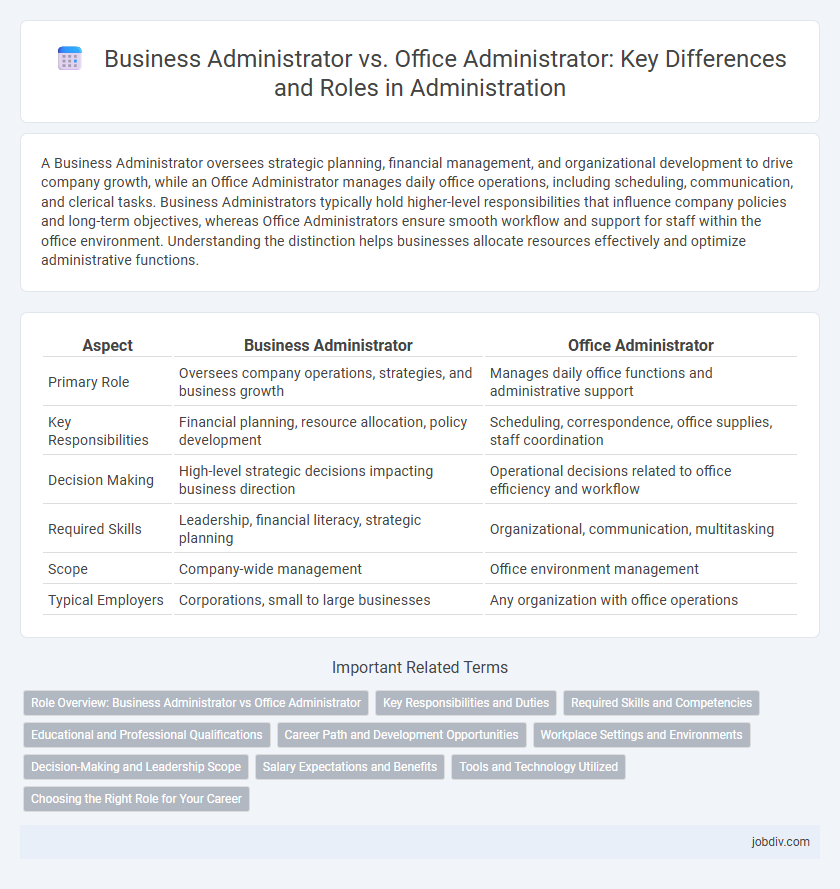A Business Administrator oversees strategic planning, financial management, and organizational development to drive company growth, while an Office Administrator manages daily office operations, including scheduling, communication, and clerical tasks. Business Administrators typically hold higher-level responsibilities that influence company policies and long-term objectives, whereas Office Administrators ensure smooth workflow and support for staff within the office environment. Understanding the distinction helps businesses allocate resources effectively and optimize administrative functions.
Table of Comparison
| Aspect | Business Administrator | Office Administrator |
|---|---|---|
| Primary Role | Oversees company operations, strategies, and business growth | Manages daily office functions and administrative support |
| Key Responsibilities | Financial planning, resource allocation, policy development | Scheduling, correspondence, office supplies, staff coordination |
| Decision Making | High-level strategic decisions impacting business direction | Operational decisions related to office efficiency and workflow |
| Required Skills | Leadership, financial literacy, strategic planning | Organizational, communication, multitasking |
| Scope | Company-wide management | Office environment management |
| Typical Employers | Corporations, small to large businesses | Any organization with office operations |
Role Overview: Business Administrator vs Office Administrator
A Business Administrator oversees strategic planning, financial management, and organizational development to drive company growth and efficiency. An Office Administrator manages daily office operations, including scheduling, communication, and record-keeping, ensuring smooth workflow and administrative support. While both roles require strong organizational skills, the Business Administrator focuses on broader business objectives, whereas the Office Administrator centers on operational tasks within the office environment.
Key Responsibilities and Duties
Business Administrators oversee strategic planning, financial management, and organizational development to drive company growth and efficiency. Office Administrators handle daily office operations, including scheduling, correspondence, and facility management, ensuring smooth administrative workflows. Both roles require strong leadership and communication skills, but Business Administrators focus on high-level decision-making while Office Administrators prioritize operational support.
Required Skills and Competencies
Business Administrators require strong financial acumen, strategic planning abilities, and proficiency in project management to oversee company operations effectively. Office Administrators need excellent organizational skills, communication abilities, and proficiency with office software to manage daily administrative tasks and support staff coordination. Both roles demand problem-solving capabilities and adaptability, but Business Administrators focus more on high-level decision-making while Office Administrators excel in operational execution.
Educational and Professional Qualifications
Business Administrators typically hold a bachelor's degree in business administration, management, or finance, often supplemented by professional certifications such as PMP or Six Sigma for enhanced project and operational expertise. Office Administrators usually possess a diploma or associate degree in office management, administration, or secretarial studies, with practical experience in office software, communication, and organizational support considered essential. Advanced roles in business administration may require an MBA or specialized certifications, whereas office administration emphasizes proficiency in clerical skills and office technology.
Career Path and Development Opportunities
Business Administrators often advance toward roles in management consulting, finance, or operations leadership through gaining strategic planning and project management experience. Office Administrators typically develop expertise in office coordination and administrative support, progressing to office manager or executive assistant roles with a focus on organizational efficiency. Both career paths offer development opportunities in communication, leadership, and technology skills, with Business Administrators generally accessing broader strategic responsibilities.
Workplace Settings and Environments
Business Administrators typically operate in corporate or organizational environments where strategic planning, financial management, and overall business operations are prioritized. Office Administrators are usually found in more localized workplace settings, such as individual offices or departments, where they focus on daily administrative support, office organization, and employee coordination. Both roles are essential, but the Business Administrator often oversees broader organizational goals while the Office Administrator manages direct office functionality.
Decision-Making and Leadership Scope
Business Administrators typically oversee strategic decision-making processes impacting the entire organization, focusing on long-term goals and resource allocation. Office Administrators manage daily operations and staff coordination within a specific department or office setting, ensuring smooth workflow and administrative support. Leadership scope for Business Administrators extends to cross-functional teams, while Office Administrators primarily lead administrative personnel and operational tasks.
Salary Expectations and Benefits
Business Administrators typically earn higher salaries than Office Administrators, with median annual wages around $75,000 compared to $45,000, reflecting broader managerial responsibilities and strategic decision-making roles. Benefits for Business Administrators often include performance bonuses, profit sharing, and comprehensive health plans, while Office Administrators usually receive standard benefits such as health insurance, retirement plans, and paid time off. The salary gap is influenced by the complexity of tasks, industry demand, and required qualifications, making Business Administrator roles more lucrative in corporate environments.
Tools and Technology Utilized
Business Administrators leverage enterprise resource planning (ERP) systems like SAP and Oracle to manage company-wide operations, while Office Administrators primarily use office productivity tools such as Microsoft Office Suite and scheduling software like Google Calendar. Business Administrators often utilize advanced analytics software for strategic decision-making, contrasting with Office Administrators who focus on communication platforms like Slack and document management systems including SharePoint. The technology stack for Business Administrators is designed to optimize cross-departmental workflows, whereas Office Administrators rely on tools aimed at enhancing day-to-day office efficiency.
Choosing the Right Role for Your Career
Business Administrators focus on strategic planning, financial management, and operational oversight to drive organizational growth, making this role ideal for those aiming at leadership and decision-making positions. Office Administrators specialize in managing day-to-day administrative tasks, coordinating office activities, and supporting staff, suitable for professionals seeking hands-on involvement in office management. Choosing between these roles depends on career goals: pursue Business Administration for broader business strategy experience or Office Administration for expertise in efficient office operations.
Business Administrator vs Office Administrator Infographic

 jobdiv.com
jobdiv.com